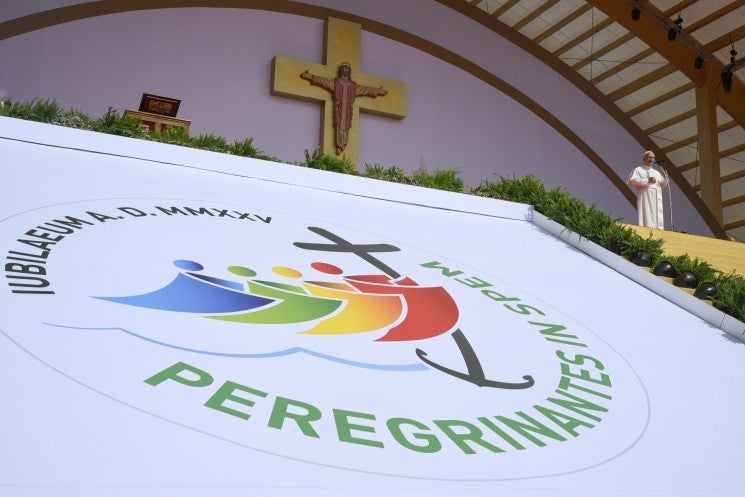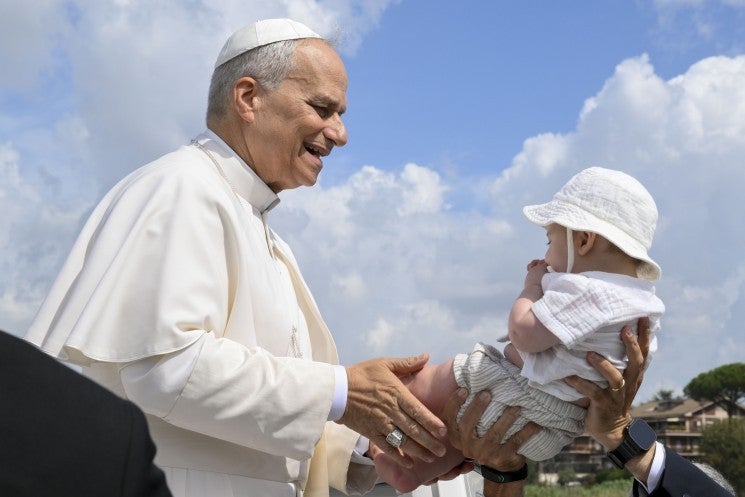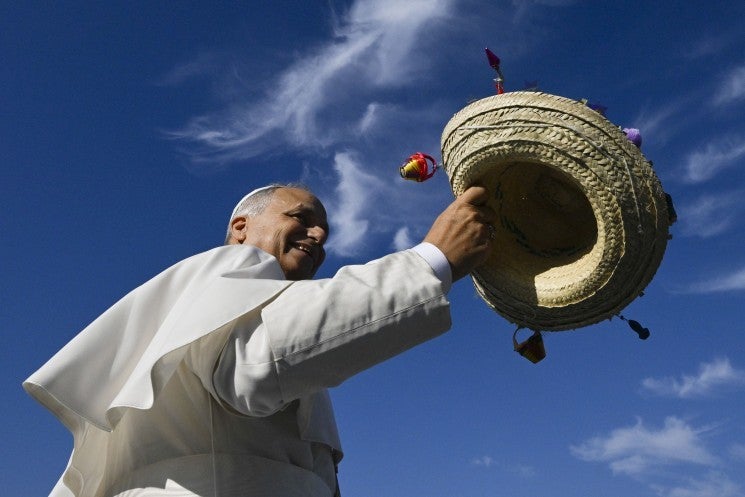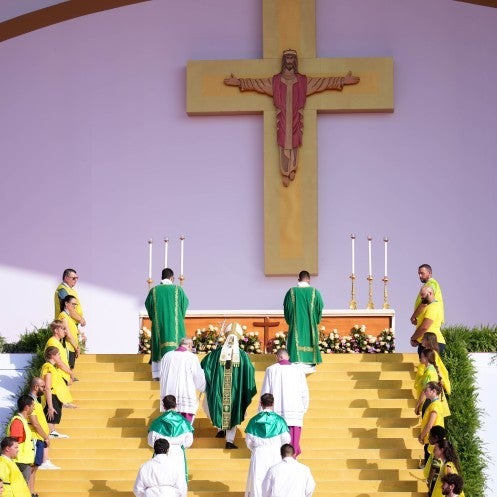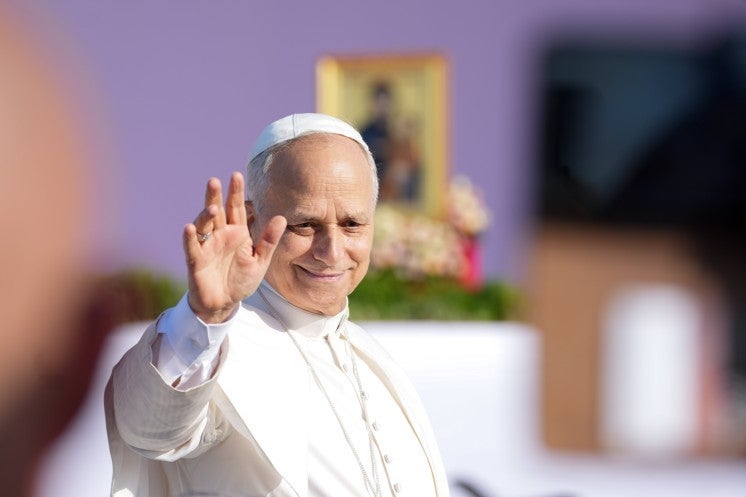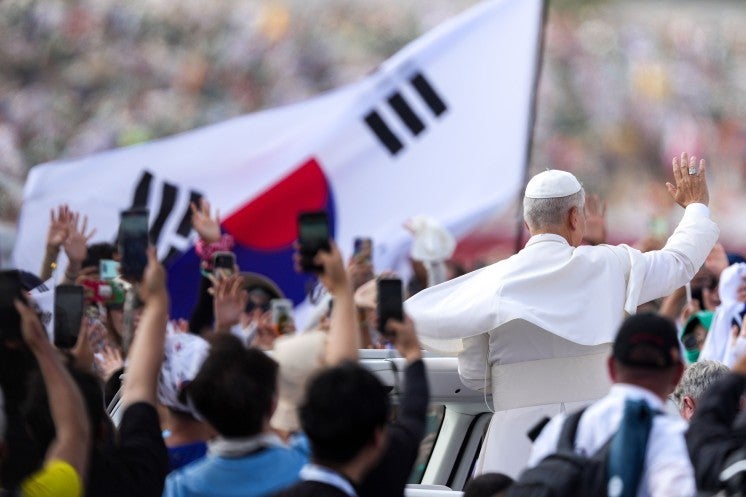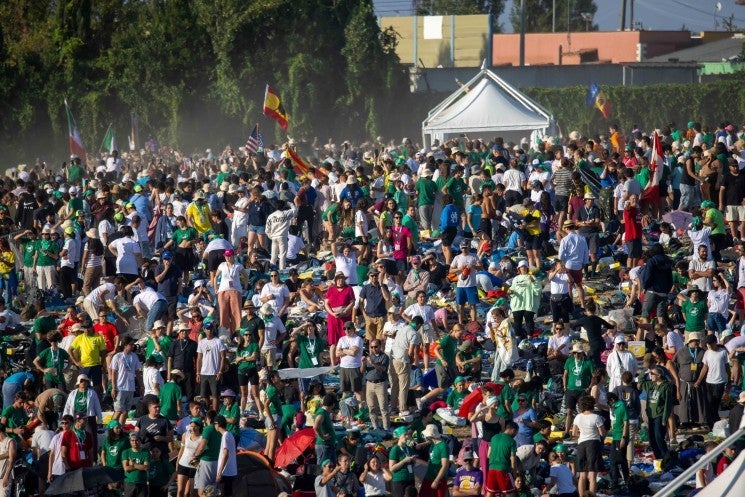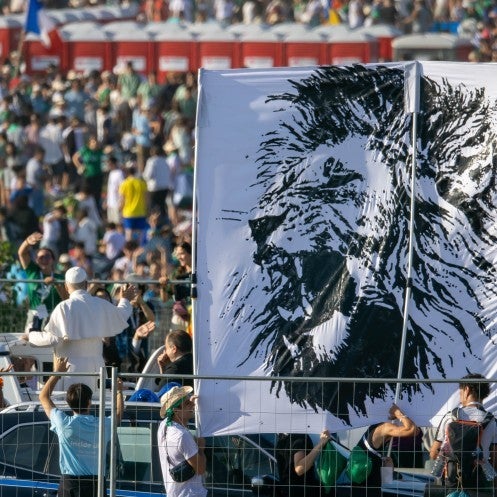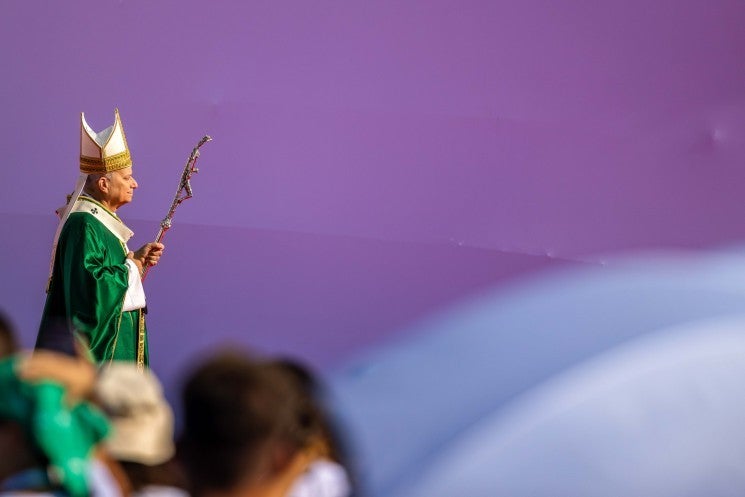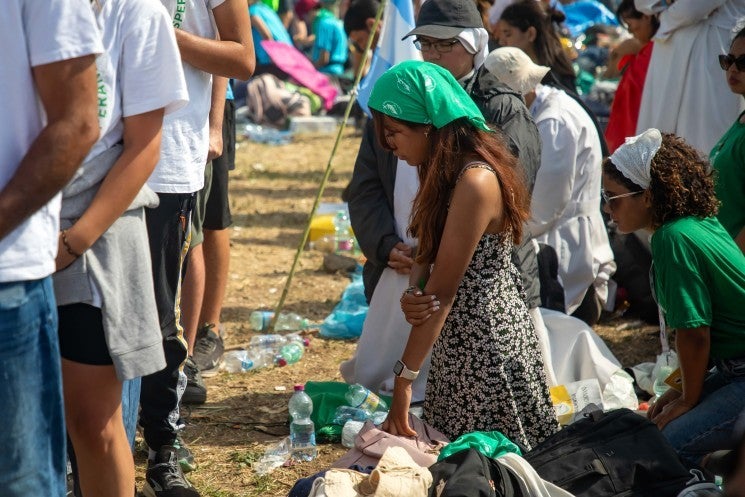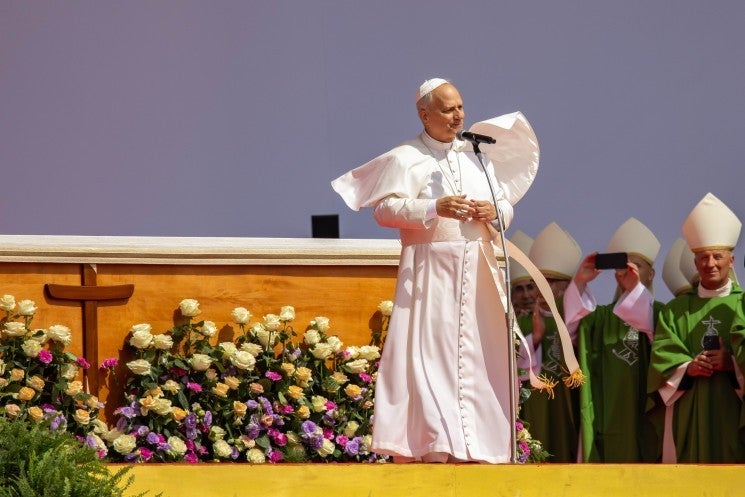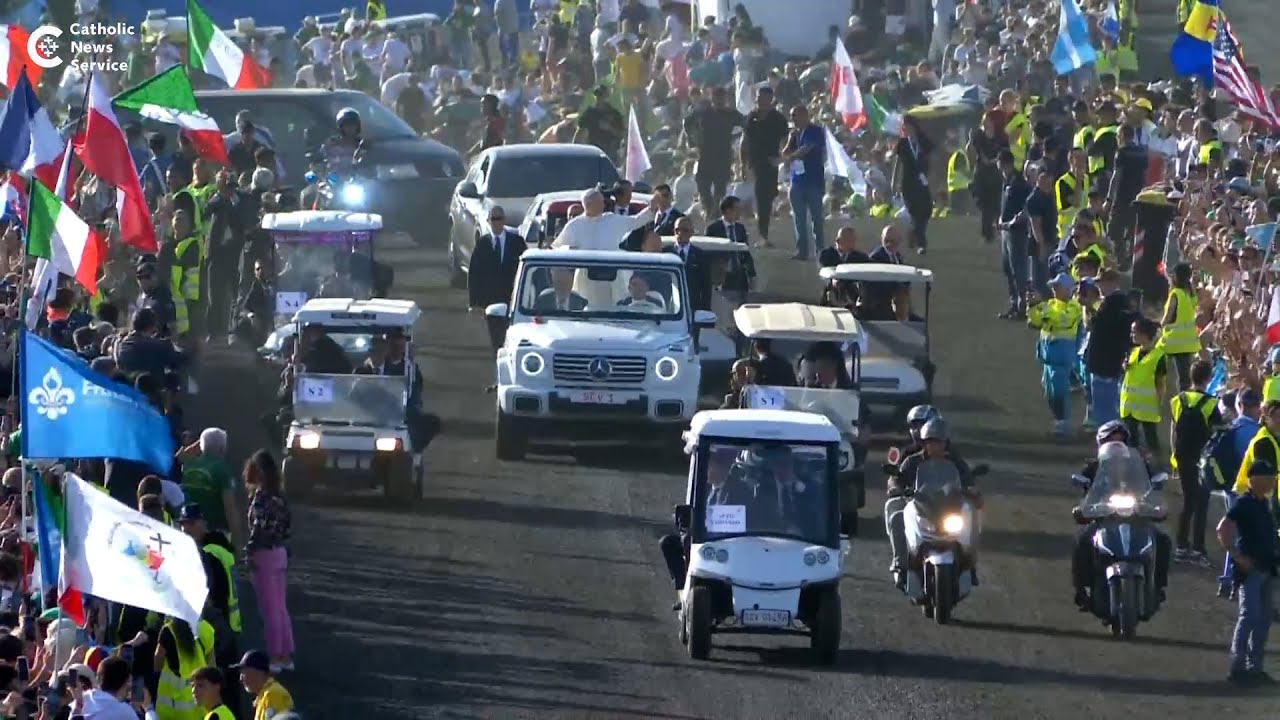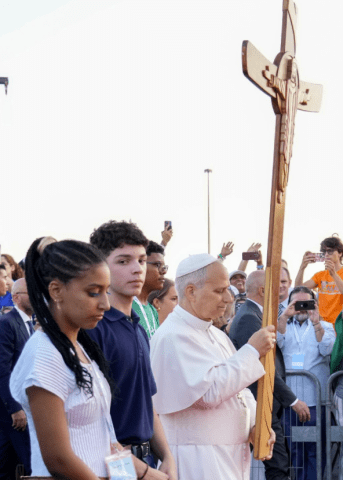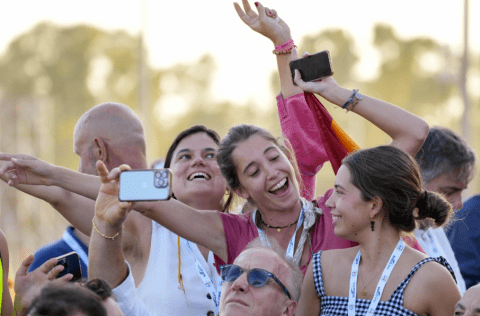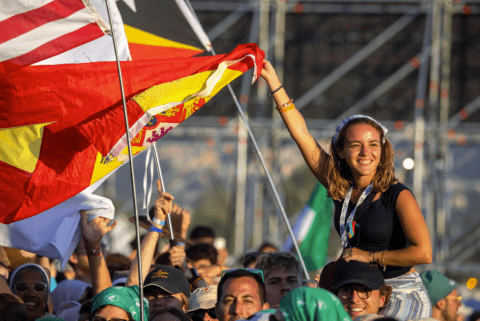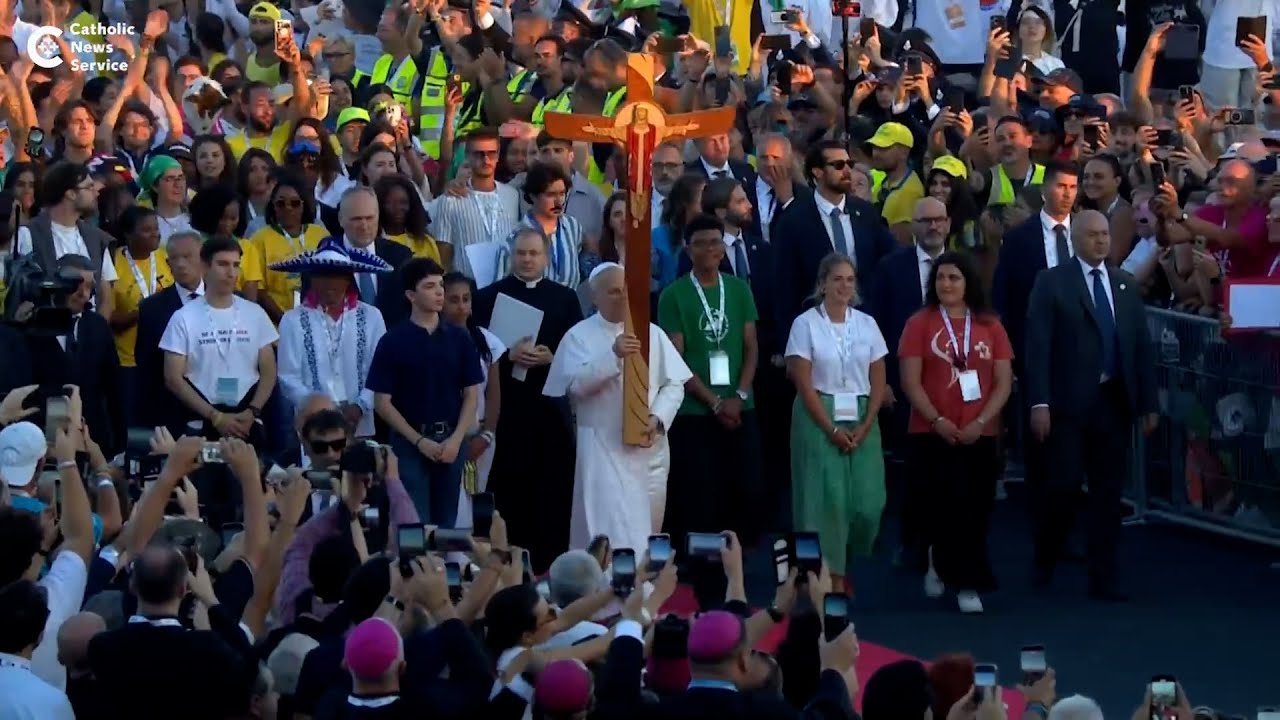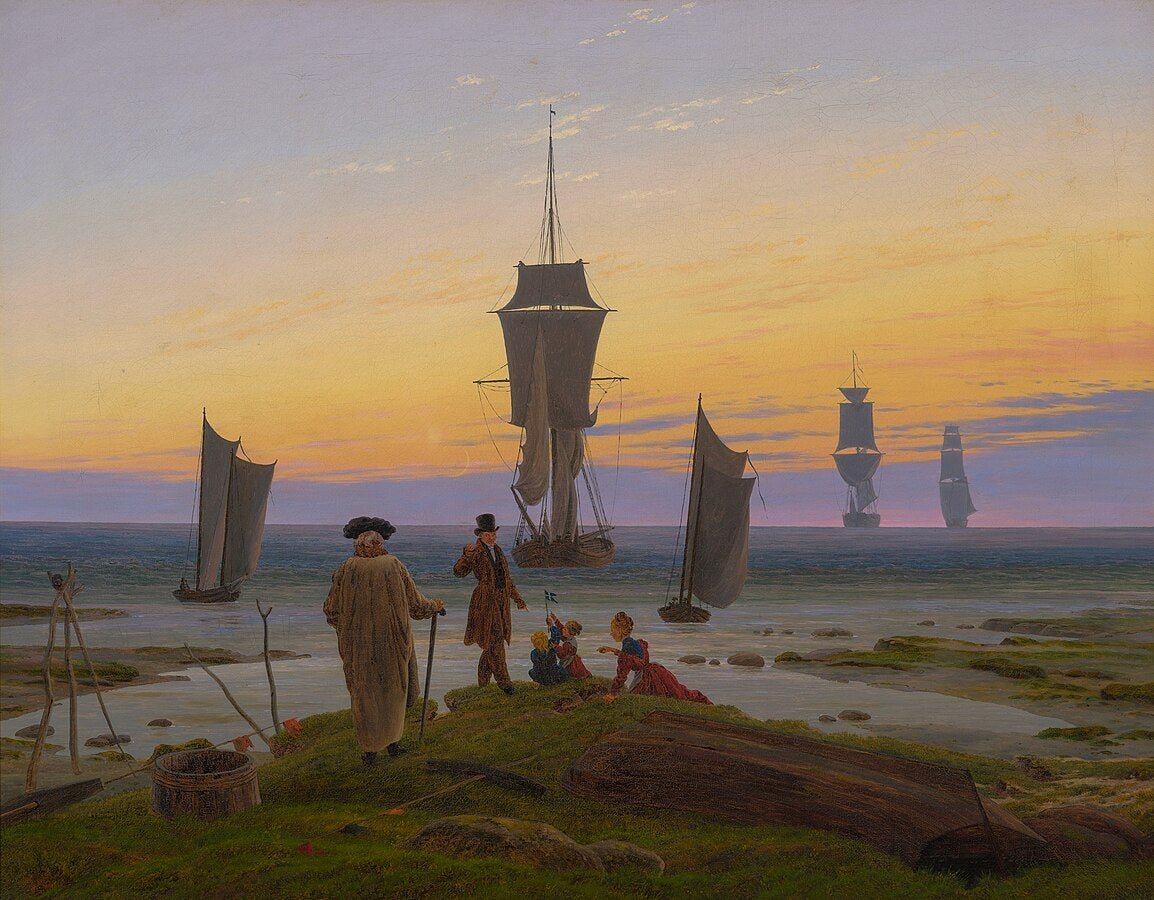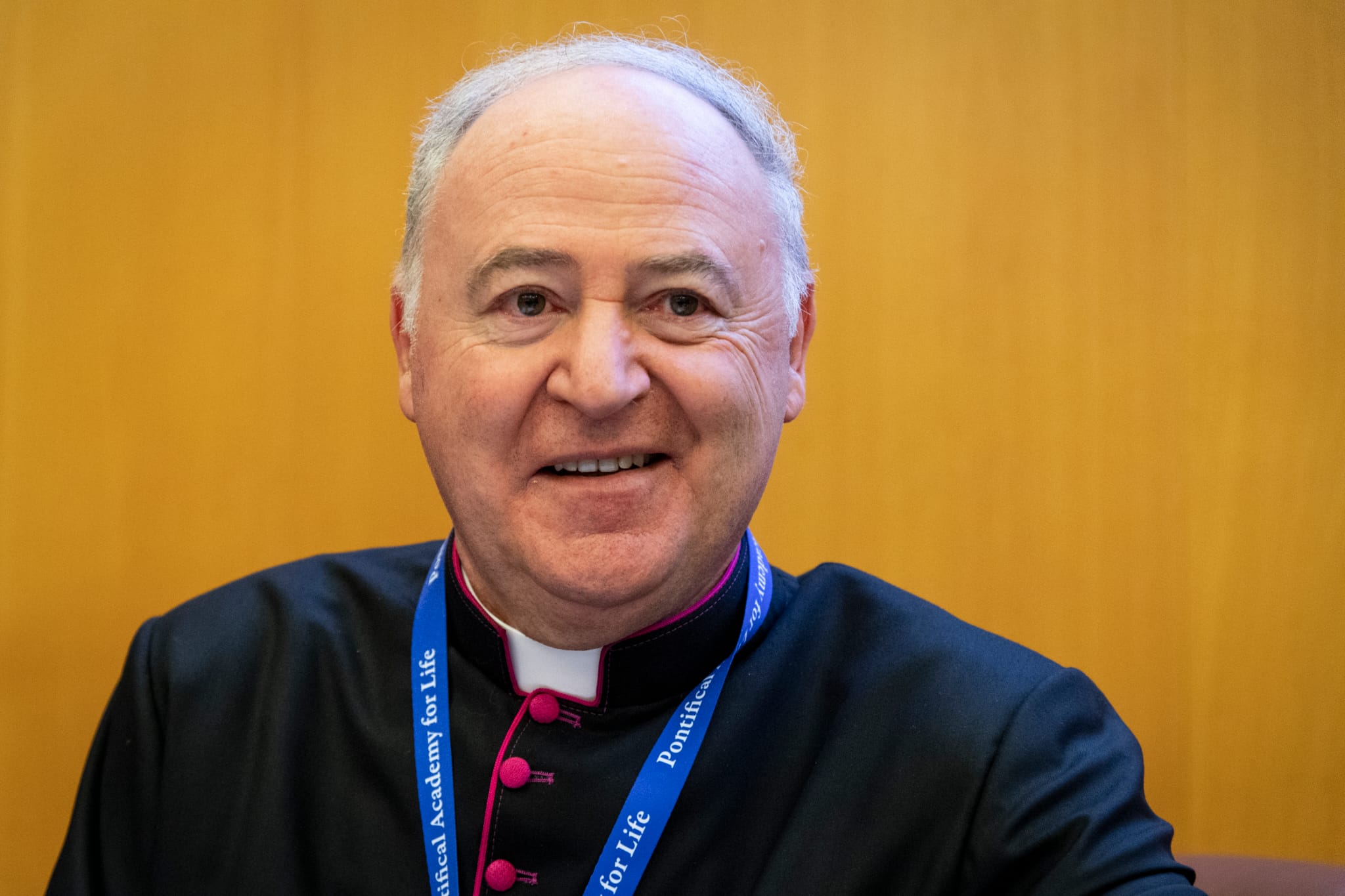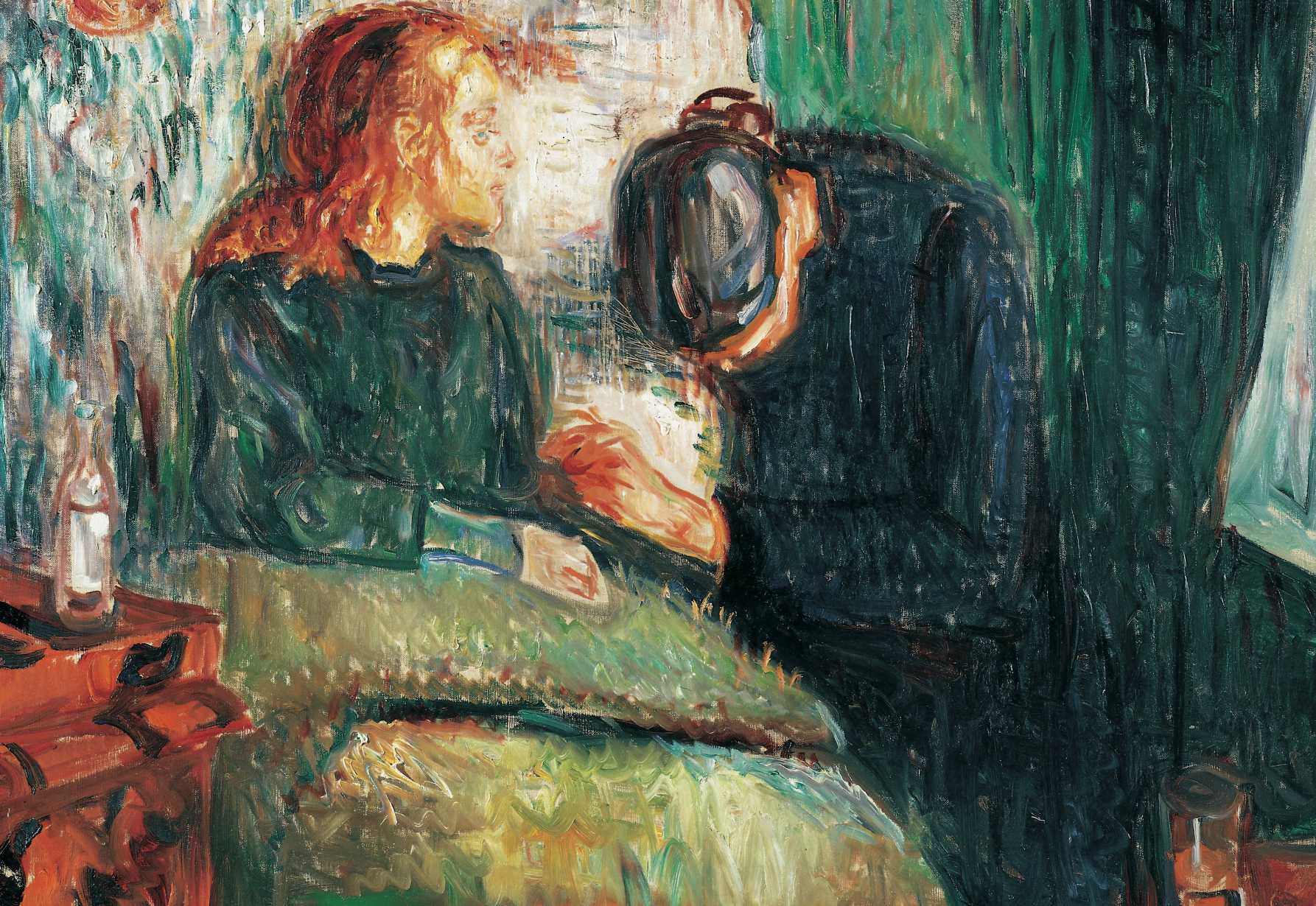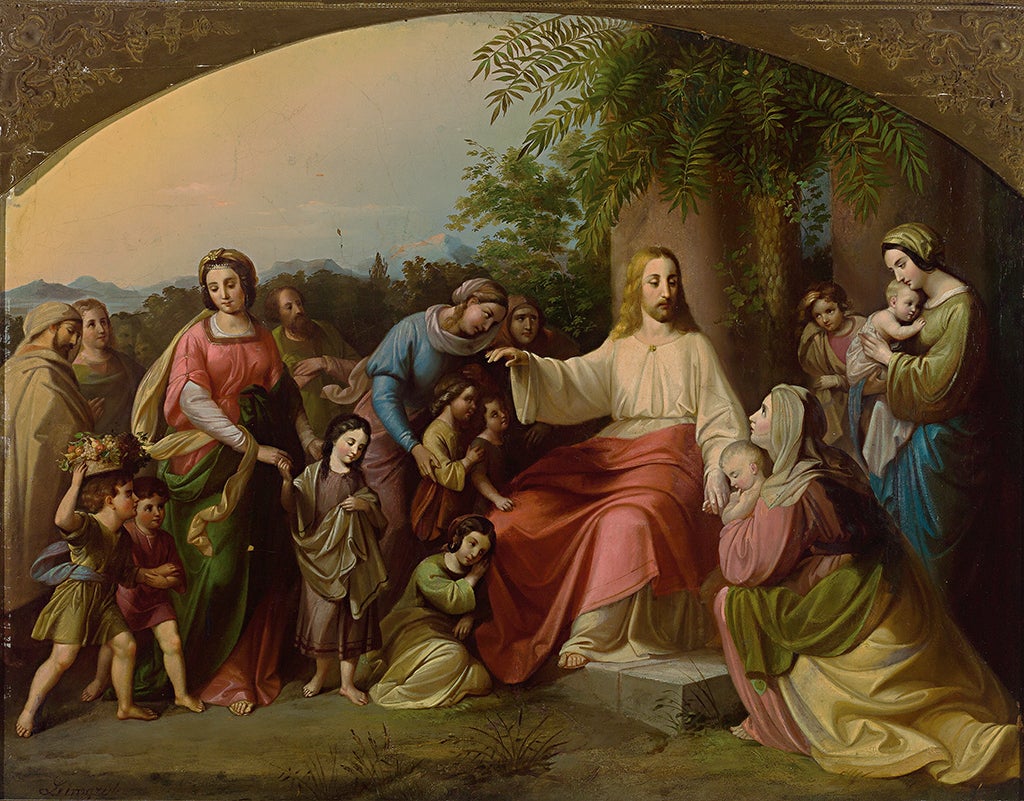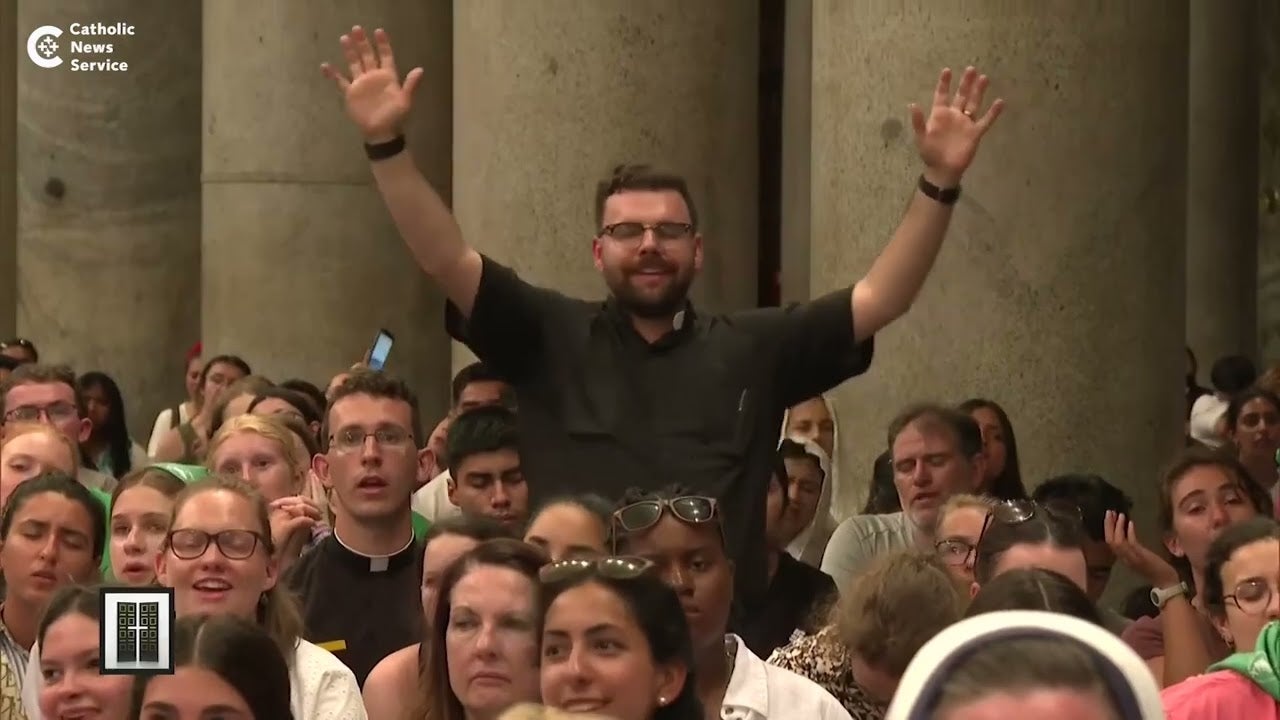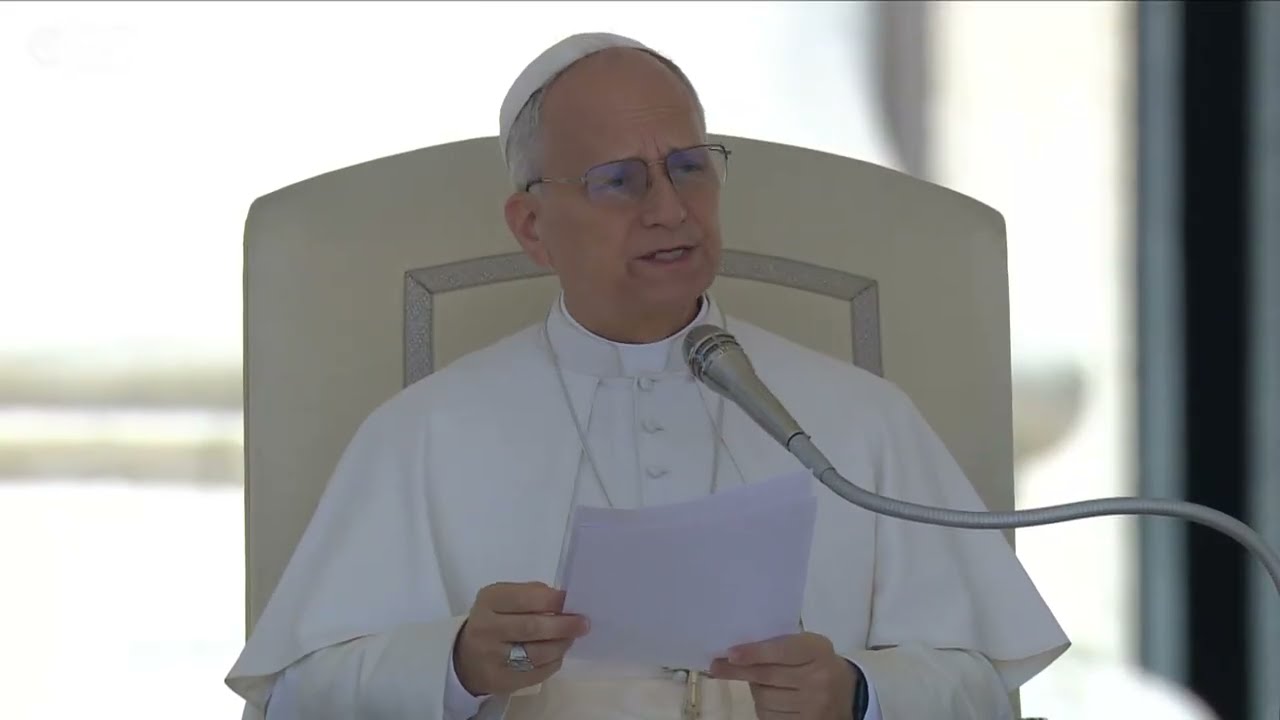Browsing News Entries
Journey together, seek real encounters, pope advises young people
Posted on 08/5/2025 08:30 AM (USCCB News Releases)
VATICAN CITY (CNS) -- A solo traveler, even using Google maps and ChatGPT, cannot safely and happily complete the journey of life or the journey of faith, Pope Leo XIV told thousands of young pilgrims meeting at the Marian shrine in Medjugorje, Bosnia-Herzegovina.
"No algorithm will ever replace a hug, a look, a real encounter -- not with God, not with our friends, not with our family," the pope wrote to people attending the international youth festival known as Mladifest Aug. 4-8.
Pope Leo urged young people to "seek genuine encounters" following the example of Mary, who "undertook a difficult journey to visit her cousin Elizabeth."
The gathering in Medjugorje was the 36th annual youth festival and the first to be held after the Vatican Dicastery for the Doctrine of the Faith published a notification in September 2024 recognizing the spiritual value of devotions connected to Medjugorje but not ruling on the authenticity of the alleged apparitions there or alleged messages from Mary.
Six young people, aged 10 to 16, said Mary began appearing to them in June 1981. Three of them say they still have apparitions of Mary each day, while the other three have them only on special occasions.
Pope Leo did not mention the apparitions or the Vatican notification in his message, instead focusing on the theme of the gathering, "Let us go to the house of the Lord."
"This phrase speaks to us of a journey, of a desire that moves us toward God, toward the place of his dwelling, where we can truly feel at home, because his love awaits us there," the pope wrote.
"On the road of life, we never walk alone," he told the young people. "Our journey is always intertwined with that of others: we are made for encounter, for walking together and for discovering a shared destination."
Young or old, he said, Christians "are not solitary pilgrims. The path toward the Lord is traveled together. That is the beauty of faith lived in the church."
Traveling to Bosnia-Herzegovina from dozens of countries, the pilgrims also discover that "there is a language stronger than any barrier -- the language of faith, nourished by the love of God."
"You are all members of his body, which is the church," the pope wrote, encouraging the young people to "meet one another, get to know one another, share with one another."
And, he said, "if any of you feels within yourselves the call to a special vocation -- to consecrated life or to the priesthood -- I encourage you not to be afraid to respond. That invitation, which you feel stirring within you, comes from God, who speaks to our hearts. Listen to him with trust: the word of the Lord not only makes us truly free and happy but leads to our fulfillment as people and as Christians."
Veterans Deserve Care and Support, not Abortion, say U.S. Bishops’ President and Pro-Life Chairman
Posted on 08/5/2025 08:30 AM (USCCB News Releases)
WASHINGTON – “The women and men who served our country, to defend innocent life, deserve quality health care and supportive resources, not the violence of abortion,“ said Archbishop Timothy P. Broglio, president of the U.S. Conference of Catholic Bishops (USCCB), and Bishop Daniel E. Thomas, chairman of the USCCB’s Committee on Pro-Life Activities, in response to a proposed rule published by the U.S. Department of Veterans Affairs (VA) on Monday.
In 2022, the VA and dependents’ civilian health benefits were changed to include abortion. The proposed rule would restore the prior, long-standing policy that prevented VA and civilian dependents’ health benefits from including abortion.
“The women and men who served our country, to defend innocent life, deserve quality health care and supportive resources, not the violence of abortion. Veterans’ health facilities must not be places of death, but places of great hope. We are grateful that the Department of Veterans Affairs is stepping up to protect preborn children and families once again from taxpayer-funded, elective abortion, and look forward to reviewing the new proposed rule in full.”
###
Lasting Peace Requires Conversion of Heart and Elimination of Nuclear Weapons, says Archbishop Broglio
Posted on 08/4/2025 08:30 AM (USCCB News Releases)
WASHINGTON - “We must renew our efforts to work for the conversion of heart required for a global commitment to lasting peace, and thus the elimination of nuclear weapons,” said Archbishop Timothy P. Broglio, president of the U.S. Conference of Catholic Bishops, in a message marking the 80th anniversary of the use of atomic weapons on the people of Hiroshima and Nagasaki.
In his message, Archbishop Broglio underscored the importance of prayer and renewed efforts toward universal nuclear disarmament and lasting peace:
“Certainly, the atrocities of war continue to be evident even in our ‘developed world,’ where human life is victimized in the womb, near death, on the streets of our modern cities, and in the various war zones of the contemporary world. We are slow to learn. Longing for peace, we pray for a change in mentality and an ever-deeper respect for every human person. We advocate that dollars be spent in favor of development rather than for arms. We pray that the attitudes and absence of dialogue that led to the use of atomic arms eighty years ago might give way to mutual understanding, peace building, and international cooperation.
“As we mark this doleful anniversary, we recognize the ongoing threat of nuclear weapons and their proliferation. We must renew our efforts to work for the conversion of heart required for a global commitment to lasting peace, and thus the elimination of nuclear weapons. This week, let us prayerfully remember the victims of Hiroshima and Nagasaki, and urge the United States and the international community to work diligently for nuclear disarmament around the world. Following Pope Leo XIV’s recent appeal, we exhort all nations to ‘shape their future by works of peace, not through violence and bloody conflict!’”
###
Don't settle for less; God is waiting to transform your life, pope tells youth
Posted on 08/4/2025 08:30 AM (USCCB News Releases)
ROME (CNS) -- The fullness of life depends on how much one joyfully welcomes and shares in life while also living with a constant yearning for those things that only come from God, Pope Leo XIV told young people.
"Aspire to great things, to holiness, wherever you are. Do not settle for less. You will then see the light of the Gospel growing every day, in you and around you," he said in his homily during Mass concluding the Jubilee of Youth Aug. 3.
The outdoor Mass, held in Rome's Tor Vergata neighborhood on the outskirts of the city, marked the culmination of a week-long series of events for the Jubilee of Youth.
More than 1 million people were estimated to be gathered across the 130 acres that had been prepared for the morning Mass, the prayer vigil the evening before, and for the hundreds of thousands of people sleeping overnight.
After touching down by helicopter less than 12 hours after leaving the evening vigil, the pope rode in the popemobile throughout the open areas -- dotted with tents and tarps, and filled with young people, cheering, waving their nation's flag, and sometimes launching at him shirts and gifts.
"Good morning!" he said in six languages from the massive stage set up for the Mass.
"I hope you all rested a little bit," he said in English. "We will shortly begin the greatest celebration that Christ left us: his very presence in the Eucharist."
He said he hoped the concluding Mass would be "a truly memorable occasion for each and every one of us" because "when together, as Christ's church, we follow, we walk together, we live with Jesus Christ."
In his homily during the Mass, the pope again highlighted the importance of the Eucharist, as "the sacrament of the Lord's total gift of himself to us."
It is Christ, the Risen One, he said, "who transforms our lives and enlightens our affections, desires and thoughts."
"We are not made for a life where everything is taken for granted and static, but for an existence that is constantly renewed through the gift of self in love," he said.
Much like a field of flowers, where each small, delicate stem may dry out, become bent and crushed, he said, each flower is "immediately replaced by others that sprout up after them, generously nourished and fertilized by the first ones as they decay on the ground. This is how the field survives: through constant regeneration."
"This is why we continually aspire to something 'more' that no created reality can give us; we feel a deep and burning thirst that no drink in this world can satisfy," he said. "Knowing this, let us not deceive our hearts by trying to satisfy them with cheap imitations!"
Pope Leo urged the young people to listen to that yearning and "turn this thirst into a step stool, like children who stand on tiptoe, in order to peer through the window of encounter with God," who has been "waiting for us, knocking gently on the window of our soul."
"It is truly beautiful, especially at a young age, to open wide your hearts, to allow him to enter, and to set out on this adventure with him towards eternity," he said.
Speaking briefly in English, the pope said, "There is a burning question in our hearts, a need for truth that we cannot ignore, which leads us to ask ourselves: what is true happiness? What is the true meaning of life? What can free us from being trapped in meaninglessness, boredom and mediocrity?"
"Buying, hoarding and consuming are not enough," he said. The fullness of existence "has to do with what we joyfully welcome and share."
"We need to lift our eyes, to look upwards, to the 'things that are above,' to realize that everything in the world has meaning only insofar as it serves to unite us to God and to our brothers and sisters in charity, helping us to grow in 'compassion, kindness, humility, meekness and patience,' forgiveness and peace, all in imitation of Christ," he said.
Evoking St. John Paul II's words during the XV World Youth Day prayer vigil held in the same spot 25 years ago, Pope Leo reminded the young people that "Jesus is our hope."
"Let us remain united to him, let us remain in his friendship, always, cultivating it through prayer, adoration, Eucharistic communion, frequent confession, and generous charity, following the examples of Blessed Pier Giorgio Frassati and Blessed Carlo Acutis, who will soon be declared saints," he said.
Wishing everyone "a good trip home," he encouraged the young people to "continue to walk joyfully in the footsteps of the Savior, and spread your enthusiasm and the witness of your faith to everyone you meet!"
Pope Leo urges youth to find hope, friendship in Christ in uncertain times
Posted on 08/3/2025 08:30 AM (USCCB News Releases)
ROME (CNS) — Addressing an estimated 1 million young people, Pope Leo XIV urged them to forge genuine relationships rooted in Christ rather than ephemeral online connections that can reduce individuals to a commodity.
"When a tool controls someone, that person becomes a tool: a commodity on the market and, in turn, a piece of merchandise," the pope said during the evening prayer vigil for the Jubilee of Youth Aug. 2. "Only genuine relationships and stable connections can build good lives."
The pope arrived by helicopter at the Tor Vergata field, roughly eight miles southeast of Rome's city center, and was greeted with cheers from young people waving flags. Many of the youth were going to camp out overnight, sleeping in tents and sleeping bags on the dusty field, much like the World Youth Day celebration held 25 years ago in the same location.
Countless young people kicked up the dust from the field as they ran alongside the popemobile to catch a glimpse of the pontiff. Pope Leo smiled and waved at the youth, occasionally catching objects and plush toys that were hurled his way.
Exiting the popemobile, he was handed the large Jubilee year cross, which he carried to the main altar, accompanied by dozens of young people.
After beginning the vigil with prayers, the pope engaged in a dialogue with several young people who asked him three questions.
Dulce Maria, a 23-year-old woman from Mexico, spoke of the excitement of online friendships but also of the loneliness that comes from connections that are "not true and lasting relationships, but rather fleeting and often illusory."
"How can we find true friendship and genuine love that will lead us to true hope? How can faith help us build our future?" she asked.
Pope Leo acknowledged the potential of the internet and social media as "an extraordinary opportunity for dialogue," but warned that these tools "are misleading when they are controlled by commercialism and interests that fragment our relationships."
Drawing from his Augustinian spirituality, Pope Leo urged young people to emulate St. Augustine, who had a "restless youth, but he did not settle for less."
"How did he find true friendship and a love capable of giving hope? By finding the one who was already looking for him, Jesus Christ," the pope said. "How did he build his future? By following the one who had always been his friend."
Gaia, a 19-year-old woman from Italy, asked how young people can find the courage to make choices amid uncertainty.
"To choose is a fundamental human act," the pope responded. "When we make a choice, in the strict sense, we decide who we want to become."
He encouraged young people to remember they were chosen by God, and that "the courage to choose comes from love, which God shows us in Christ."
The pope recalled St. John Paul II's words spoken in the same place 25 years ago, reminding the youth that "it is Jesus in fact that you seek when you dream of happiness; he is waiting for you when nothing else you find satisfies you."
The pope called "radical and meaningful choices," such as marriage, priesthood and religious life, "the free and liberating gift of self that makes us truly happy."
"These choices give meaning to our lives, transforming them into the image of the perfect love that created them and redeemed them from all evil, even from death," he said.
Departing from his prepared remarks, Pope Leo expressed condolences for the deaths of two pilgrims. Pascale Rafic, an 18-year-old pilgrim from Egypt, who died due to a heart condition. Earlier in the day, the pope met with a group of Egyptian youth with whom Rafic traveled to Rome.
Maria Cobo Vergara, a 20-year-old pilgrim from Madrid, Spain, died July 30. While the cause of death was not mentioned in a statement published Aug. 1, the Archdiocese of Madrid said the young pilgrim suffered "four years of illness."
"Both (pilgrims) chose to come to Rome for the Jubilee of Youth, and death has taken them in these days," the pope said at the vigil. "Let us pray together for them."
Lastly, 20-year-old Will, a young pilgrim from the United States, asked the pope how to "truly encounter the Risen Lord in our lives and be sure of his presence even in the midst of trials and uncertainties."
Recalling Pope Francis' papal bull for the Holy Year 2025, "Spes non confundit" ("Hope Does Not Disappoint"), Pope Leo said that "hope dwells as the desire and expectation of good things to come," and that one's understanding of good "reflects how our conscience has been shaped by the people in our lives."
He urged them to foster their conscience by listening to Jesus' word and to "reflect on your way of living, and seek justice in order to build a more humane world."
"Serve the poor, and so bear witness to the good that we would always like to receive from our neighbors," he said. "Adore Christ in the Blessed Sacrament, the source of eternal life. Study, work and love according to the example of Jesus, the good Teacher who always walks beside us."
He also invited young people to pray to remain friends with Jesus and be "a companion on the journey for anyone I meet."
"Through praying these words, our dialogue will continue each time we look at the crucified Lord, for our hearts will be united in him," the pope concluded.
CNS interviews the new president of the Pontifical Academy for Life
Posted on 08/1/2025 08:30 AM (USCCB News Releases)
VATICAN CITY (CNS) -- One of Pope Leo XIV's early appointments was naming Msgr. Renzo Pegoraro to be the new president of the Pontifical Academy for Life.
The 66-year-old monsignor is a bioethicist who earned a medical degree before entering the seminary, and he had served as chancellor of the academy since 2011 before succeeding Archbishop Vincenzo Paglia as president at the end of May.
Msgr. Pegoraro earned his medical degree from the University of Padua, Italy, in 1985, before earning a degree in moral theology from the Pontifical Gregorian University in Rome. He was ordained to the priesthood in 1989.
He earned an advanced degree in bioethics from Italy's Catholic University of the Sacred Heart and has taught bioethics at the Theological Faculty of Northern Italy and served as secretary-general of Padua's Lanza Foundation, a center for studies in ethics, bioethics and environmental ethics. He taught nursing ethics at the Vatican-owned Bambino Gesù Pediatric Hospital in Rome and was president of the European Association of Centers for Medical Ethics from 2010 to 2013.
Catholic News Service reached out to Msgr. Pegoraro for an interview in July. He took time out of a trip outside of Rome to respond to our questions. His written responses are translated from the original Italian.
- - -
Congratulations on your appointment. Did Pope Leo XIV say anything to you about your appointment or give you any indications and insight as to the priorities or the role the academy can play in his ministry?
The recommendations are to continue the work of discussion and dialogue with experts from various disciplines on the challenges facing humanity on the theme of life and the quality of life in different contexts. And without forgetting issues related to the beginning and end of life, as well as environmental sustainability, equity in healthcare systems, the right to care, health and essential services. We live in a difficult landscape, marked by advancing technologies but also by conflicts, and human life on the planet is truly challenged. The church has a wealth of wisdom and a vision to serve everyone in order to make the world a better and more livable place.
Do you know how the pope will approach the topic of AI -- for example, an encyclical -- and will your academy play a role in giving him input, the way the Dicastery for Integral Human Development helped Pope Francis with 'Laudato Si''?
Pope Leo XIV demonstrated early on, with the choice of his name, that he is putting social issues and integral human development first. He has already spoken on several occasions about technological challenges and AI. In this sense, the Pontifical Academy for Life can make an important contribution to the development of the papal Magisterium, in line with all the dicasteries.
Will there be any follow-up to what came out of the seminar/study of the Theological Ethics of Life? How will the academy continue to explore and address topics like abortion, IVF, contraception and end-of-life issues?
The reflection of our academics continues. We are following the debates underway in different countries, as well as in Italy, where there is a law before parliament. The Pontifical Academy for Life supports and promotes palliative care, always and especially in the final and fragile phases of life, always asking that there be attention to and respect for the protection and dignity of people who are frail.
How can the church communicate its bioethical/life teachings better wherever there is a lot of debate or polarization?
This is a very important issue. We do our best to offer in-depth and articulate reflections. For example, our general assembly of academics, which includes an international conference, will address the sustainability of health systems in February 2026, with examples from five continents and detailed studies. We work this way: to offer a contribution; it is our desire to broaden collaboration as much as possible with everyone who is truly interested in the common good, believers and nonbelievers alike, in a spirit of mutual learning.
Will you continue to promote a transdisciplinary approach of dialogue with experts beyond the Catholic Church, much like the way the Pontifical Academies for the Sciences and Social Sciences operate? If so, how do you go about reassuring Catholics who wish the academy only had members and presentations that are aligned with church teaching? How do you avoid any so-called 'confusion?'
The Pontifical Academy for Life, since its beginning, has been a place of study, dialogue, discussion and reflection among experts from different disciplines. And it has continued its work in the service of the church, to analyze developments in science and technology that have to do with human life and to always understand how to defend the dignity of the human person. In this sense, the church, in continuity, is always staying up-to-date, as the Second Vatican Council put it so well.
Tell me about being both a physician and a priest. Are you the first president of the PAL who is a medical doctor? How do you balance what you saw and learned in the field -- your clinical experience -- with your ethical reasoning? Such as respecting a patient’s autonomy and respecting church teaching when it comes to assisted suicide or refusing aggressive treatment?
I remember that the first president, the late Dr. Jerome Lejeune, was a physician, a scientist of the highest class, worthy of a Nobel Prize for his studies. And later, Msgr. Ignacio Carrasco de Paula, who served as president from 2010 to 2016, is a medical psychiatrist and priest, a high-level expert in bioethics.
Having expertise in the medical field is a great help in having a more precise understanding of the findings and challenges that arise on an ethical level. But there is more than that, as you point out in your question. Today, in addition to scientific knowledge, there is a need for an ethical point of view and an awareness of the questions that come from patients, from those who are sick. The church can respond.
For example, on the issue of end-of-life, the church says 'no' to aggressive medical treatment -- therapeutic obstinacy -- and 'yes' to the use of palliative care to manage and reduce pain and suffering.
The studies and insights we have made in recent years are just as important on the topics of stem cells and biotechnology, neonatal screening, organ transplantation and innovations in digital medicine and health care technology. These are all efforts to better understand scientific developments so that we can put them at the service of people.
Could you better explain if there have been any changes or new recommendations when it comes to avoiding aggressive treatment and the requirement to provide food and hydration to individuals in a vegetative state? Where does the church draw the line between legitimate medical care and overreach?
The topic is very complex. We need to understand how to interpret treatments so that they may support and care for sick people. Every situation is to be evaluated on a case-by-case basis so that they support the sick person and are not a source of further suffering. That is why there are no ready-made solutions; instead, an approach of constant dialogue between doctor, patient and family members must be fostered.
How do you ensure the ethical frameworks being proposed are not just “Western,” but also include all realities across the globe? There is a lot of attention on first-world issues like IVF or assisted suicide, and yet many people in the world are dying because of a lack of nutrition, clean water and basic medical care….
This will be the theme of our international congress in February, as part of the general assembly of academy members. We want to end up with a strong call to understand that 'health' and health systems must provide answers centered on life in all contexts, in all social and political realms. In many countries, the lack of basic care, the lack of water and the lack of food pose so many problems. Added to this are conflicts, which cause further suffering. And so that is why we say 'no' to war, because today we need resources to make human beings live, not to build weapons and finance conflicts.
Your predecessor (Archbishop Vincenzo Paglia) helped spearhead the "Rome Call for AI Ethics." How will the academy build on that, especially regarding AI in medicine?
Together with Catholic Physicians Throughout the World (F.I.A.M.C.), we are organizing an international conference in Rome Nov. 10-12 on "AI and Medicine: The Challenge of Human Dignity" (www.aimedicine.va), precisely to confront the changes introduced by AI. It is a way to enhance the "Rome Call for AI Ethics," signed in 2020, a document that lays the foundations for an ethical use of AI, which impacts all areas: medicine, science, society and legislation.
As the population ages, the use of robots in eldercare is increasing. And robotics is making huge strides in helping those with disabilities, too. How do you navigate the benefits of robotics with ethical concerns about human connection and dignity?
The progress is extraordinary. We must never forget that the needs of the person who is sick and in need of help are the priority. That is what technology must serve: it must not become an end in itself, and we must not fall into a 'technocracy.' We want to put the person and his or her inherent dignity at the center.
As young people grow up in a world shaped by artificial intelligence and social media, how can they learn to make ethical decisions about technology that has such a big impact on their mental health and relationships?
Change has already happened, both because these tools, such as smartphones, have already made it into the hands of the very young and because of the impact they have on cognitive function. There needs to be a debate on the use of technology that includes all facets of society. For example, families need to be helped with children and their relationship with technology. And schools have a major role to play in education.
Really, everything can be addressed if all of society -- policy-makers, governments, the church, different organizations -- put the issue of the use of technology at the forefront. Let's also recall the recent contribution of the document, 'Antiqua et nova,' from the Dicasteries for the Doctrine of the Faith and Culture and Education, for an anthropological reflection that provides criteria for discernment on these issues. What is needed is ongoing, steady and high-level public debate. And the media also have a very important role in disseminating information and subject matter on this.
What is the single most urgent bioethical issue you would like to tackle and the biggest AI issue?
The topic of data management, its use and storage, the objectives of the so-called 'Big Companies,' (ed. note: Google, Apple, Facebook, Amazon, Microsoft, etc.) is crucial.
Today, we are talking about global bioethics: the topic of human life must be posed by looking at all dimensions of its development, at different social and political contexts, at its connection with respect for the environment, and by scrutinizing how technologies either help us live more fully and better or (hurt us by) providing terrible tools for control and manipulation. This is why the topic of 'data' is key. Today, the wealth of big industries is the data we ourselves put on the internet.
We need a public debate on a global scale, a grand coalition aimed at the respect of data. The European Union has taken up the issue, and it is also being studied at the United Nations. But it is not enough. A global debate is needed. The framework is clear and Pope Francis gave it to us with "Fratelli Tutti," expanding on Vatican II: we are one human family, and the issues of development and life affect every one of us.
Bishop at US gathering in Rome: To follow God's call is a 'spiritual adventure'
Posted on 07/31/2025 08:30 AM (USCCB News Releases)
ROME (CNS) -- God, not AI, answers the questions that really matter in life, and God has an idea of the saint everyone is meant to be, said two U.S. bishops speaking at a national gathering in Rome.
More than 4,000 pilgrims from the United States flocked to St. Paul's Outside the Walls for the USA National Jubilee Pilgrim Gathering July 30 as part of the Jubilee of Youth taking place July 28-Aug. 3.
The evening event, sponsored by the U.S. Conference of Catholic Bishops with the support of the Knights of Columbus, featured prayer, music, moments of witness, Eucharistic adoration and a solemn procession of the relics of a dozen saints and blesseds, including Blesseds Stanley Rother, Carlo Acutis and Pier Giorgio Frassati, and Sts. Paul, Kateri Tekakwitha and Elizabeth Ann Seton.
After U.S. Cardinal James Harvey, archpriest of the basilica, welcomed the pilgrims, Bishop Robert E. Barron of Winona-Rochester, Minnesota, gave the keynote address, highlighting the stories of several biblical figures and how "the Bible tells the story of a great adventure," that of being called by God "to a higher life."
"And that's the adventure of the spiritual life, everybody. Don't ever let them tell you that religious people are kind of dull, stay-at-home types," said the bishop, who is also chairman of the USCCB committee of Laity, Marriage, Family Life and Youth, and head of Word on Fire Catholic Ministries.
"On the contrary, it seems to me, religion at its best is always a summons to adventure," he said.
Faith is cultivating an "attitude of trust in regard to the summoning power of God," he said, and "to be a person of faith is to accept that call and to place one's will within the higher will of God."
If one chooses to "settle for the person I am, to accept things the way they are, to just listen to the voices of people around me," Bishop Barron said, then "that is to live in this very narrow, cramped space."
But Jesus told his disciples to "stop playing around in the shallow waters" of their own limited imaginations and to instead go "into the deep" or toward the great heights "of the person that God wants you to be," he said.
"God has an idea of the saint you were meant to be," he said, and "a person of faith is to open your heart trustingly to that call."
In fact, the most spiritually important question and the greatest decision one can make, he said, is "Who will I be?"
However, the mission God gives is never easy, he said, because "he's summoning us up out of ourselves to the heights."
"We hear the mission. We know what it is. We know the call to radical love, radical self-gift. But we tend to go the other way," he said, which tends to trigger some kind of "storm" or struggle in one's life.
"Is God being vindictive? No," Bishop Barron said. "It's spiritual physics. It's when you go against the divine call, storms kick up in you."
"Refusing your mission is bad for you, and bad for people around you, because you were meant to help them in some way," he said.
"What happens when we accept the mission?" he asked. "You don't know who you are until you find your mission," which comes by asking, "Whom do you worship, what voice do you listen to, and what's the mission that voice is giving to you?"
Each mission is unique to each individual, he said, "but it'll look something like a path toward greater self-gift, a greater letting go," much like the crucified Jesus, who gave his life away in love.
During the hour of Eucharistic adoration, Bishop Edward J. Burns of Dallas gave a homily in the presence of the Blessed Sacrament, placed on the altar over the tomb of St. Paul.
Hope is "alive within us because of the Holy Spirit, who dwells in us and equips us, not with artificial intelligence, but with divine intelligence," said the bishop who is chairman-elect of the USCCB Committee of Laity, Marriage, Family Life and Youth.
Search engines and AI models can help people with almost everything and answer so many questions, he said. "But let us remember the answers that truly matter do not come from codes or algorithms."
When praying to the Lord and before the Blessed Sacrament, ask those essential questions, he said, so that "you may be given the answers that truly matter," that uphold the dignity of every human life and every human person, and "that lead us to mercy and to compassion."
"The answers that we need are whispered by the Holy Spirit who dwells within us," Bishop Burns said.
"The Spirit of God doesn't merely inform us. The Spirit of God transforms us," he said. "With technology, we can see what is trending in our world. But with God's love, we can see what's timeless."
Before the Blessed Sacrament, the faithful do not ask for "quick answers, but for hearts renewed," he said.
"In the end, it is not data that will change the world, it's disciples -- disciples whose lives proclaim that Christ has died, Christ is risen and Christ will come again," Bishop Burns said.
Bishop Zaidan Commends President for Acknowledging Starvation in Gaza and Urges Administration to Expand Humanitarian Access
Posted on 07/31/2025 08:30 AM (USCCB News Releases)
WASHINGTON - “I commend President Trump for acknowledging that starvation is happening in Gaza, especially affecting children, and I urge him to demand the immediate expansion of humanitarian assistance through all channels in Gaza,” said Bishop A. Elias Zaidan, chairman of the U.S. Conference of Catholic Bishops’ Committee on International Justice and Peace. Bishop Zaidan’s comments follow reports that the United States would work with its allies to distribute aid to Gaza to address the humanitarian crisis:
“As the world watches in horror the heart-rending images of starvation in Gaza, I call on Catholics and all men and women of good will to ardently pray for the alleviation of the suffering of the Gazan people—a crisis already ranked as one of the worst humanitarian disasters of the 21st century. Pope Leo XIV has often reiterated his ‘heartfelt appeal for a ceasefire, for the release of hostages, and for the full respect for humanitarian law’ in Gaza, and I add my voice and prayers to that of our Holy Father.
“I commend President Trump for acknowledging that starvation is happening in Gaza, especially affecting children, and I urge him to demand the immediate expansion of humanitarian assistance through all channels in Gaza. Reflecting Christ’s mandate in the Gospel to love one another, Pope Leo XIV’s challenge to us is clear: ‘We cannot pray to God as “Father” and then be harsh and insensitive towards others. Instead, it is important to let ourselves be transformed by his goodness, his patience, his mercy, so that his face may be reflected in ours as in a mirror.’
“I would also like to express our heartfelt solidarity with His Eminence Cardinal Pierbattista Pizzaballa, Patriarch of Jerusalem, our fellow Christian brothers and sisters, and all men and women of good will in the Holy Land, especially those suffering from unprovoked violence. Let us pray that the Holy Spirit, creator and vivifier, may infuse fraternal love into the hearts and minds of peoples of all faiths living in the lands of our Lord’s life, death, and glorious resurrection.”
###
Learning to communicate with honesty, prudence can help heal world, pope says
Posted on 07/30/2025 08:30 AM (USCCB News Releases)
VATICAN CITY (CNS) -- The world -- marked by a climate of violence and hatred -- needs healing, Pope Leo XIV said.
"We live in a society that is becoming ill due to a kind of 'bulimia' of social media connections: we are hyperconnected, bombarded by images, sometimes even false or distorted," he told thousands of pilgrims gathered in St. Peter's Square for his general audience July 30.
By learning to communicate with honesty and prudence, Christians can help avoid wounding others, and by sharing the Gospel, they can lead people to be healed by his word, he said.
It was his first public general audience since taking a brief summer break in July. Tens of thousands of people, many of them pilgrims in Rome for the July 28-Aug. 3 Jubilee of Youth, including many groups from the United States, and some traveling with their bishops.
Archbishop Nelson J. Pérez of Philadelphia, for example, was traveling with a delegation of about 40 young people and youth ministers. He had a chance to greet the pope after his main talk, giving him a green ballcap of the Philadelphia Eagles football team.
Visitors in the square also gifted the pope several presents as he rode around in the open popemobile, such as two white cowboy hats and a small takeaway pizza box.
The popemobile stopped near people holding two large handwritten signs saying, "Pope Leo, I brought you (pizza) from Chicago" and "We have Aurelio's pizza," the name of a pizzeria-restaurant based in Homewood, Illinois, south of Chicago and near the suburb where the pope grew up.
The pope took the box, saw what it was, and gave the group a thumbs-up. On its website, the restaurant boasts its own take on a pepperoni pizza with "the Poperoni™ Pizza to honor the pope's most recent visit and love of Aurelio's pizza."
His catechesis, dedicated to the Jubilee theme of "Jesus Christ our Hope," was the last in a series of talks on Jesus' public ministry. He focused on "the healing of a deaf man" in the Gospel of St. Mark (7:31-37).
"This time in which we live also needs healing. Our world is witnessing a climate of violence and hatred that demeans human dignity," the pope said.
"We are overwhelmed by countless messages that stir within us a storm of contradictory emotions," he said.
In fact, "it is possible that within us arises the desire to turn everything off. We may come to prefer not to feel anything anymore," he said. "Even our words risk being misunderstood, and we may be tempted to close ourselves in silence, into a lack of communication where, despite our closeness, we are no longer able to say to one another the most simple and profound things."
The Gospel account of the deaf man who had a speech impediment shows Jesus' understanding of "what lies behind the silence and closure of this man, as if Jesus had perceived his need for intimacy and closeness."
"Jesus offers him silent closeness," touches him and says, "Ephphatha!" that is, "Be opened!"
"It is as if Jesus were saying to him, 'Be opened to this world that frightens you! Be opened to the relationships that have disappointed you! Be opened to the life you have given up facing!' Closing in on oneself, in fact, is never a solution," he said.
"All of us experience what it means to be misunderstood, to feel that we are not truly heard," he said. "All of us need to ask the Lord to heal our way of communicating, not only so that we may be more effective, but also so that we may avoid wounding others with our words."
"Dear brothers and sisters, let us ask the Lord that we may learn to communicate with honesty and prudence," he said.
"Let us pray for all those who have been wounded by the words of others," he said. "Let us pray for the church, that she may never fail in her mission to lead people to Jesus, so that they may hear his Word, be healed by it, and in turn become bearers of his message of salvation."
Bipartisan Collaboration on Immigration Reform is Still Possible, says Bishop Seitz
Posted on 07/29/2025 08:30 AM (USCCB News Releases)
WASHINGTON – Earlier this month, an expansive, bipartisan immigration reform bill was introduced by Rep. Maria Salazar and Rep. Veronica Escobar. The two legislators were joined by over twenty of their colleagues in the U.S. House of Representatives, introducing the newest version of the Dignity Act. Bishop Mark J. Seitz of El Paso, chairman of the U.S. Conference of Catholic Bishops’ Committee on Migration, offered his appreciation for the bill, specifically commending the bipartisan collaboration:
“At a time when instances of bipartisan cooperation seem to be few and far between, especially related to immigration, I am deeply grateful to Congresswoman Salazar, Congresswoman Escobar, and their colleagues for this sustained commitment to working across the aisle. Bipartisan collaboration is not only possible, it’s absolutely necessary. Pope Leo XIV has emphasized the responsibility of all political leaders to promote and protect the good of the community, the common good, particularly by defending the vulnerable and the marginalized. Under our current system, families across our nation are living in fear. Bipartisan proposals such as the Dignity Act are a step toward fulfilling the call made by our Holy Father to offer a better way forward—one that begins and ends with respect for the God-given dignity of every person.”
###

